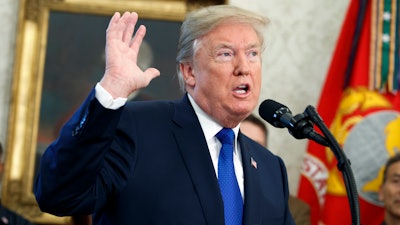
WASHINGTON (AP) — A $100 billion semiconductor company based in Singapore will legally relocate its home address to the United States, President Donald Trump announced Thursday.
Broadcom Limited, which manufactures communications chips around the world, said it would relocate its legal address to Delaware once shareholders approve the move, bringing $20 billion in annual revenue back to the U.S. The move will allow Broadcom to avoid a cumbersome federal review process.
The Oval Office announcement was tied to the release of congressional Republicans' tax reform proposal, which would drastically reduce corporate rates and makes it easier for companies to deduct foreign taxes.
The company credits the GOP plan with making it easier to do business in the U.S. "America is once again the best place to lead a business with a global footprint," Broadcom CEO Hock Tan said.
However, Broadcom's move to the U.S. will take place regardless of whether the Republican plan passes, the company said.
The company didn't respond to requests to explain its claim that the move would bring $20 billion in annual revenue to the United States. Its most recently reported annual revenue was $13.2 billion worldwide.
A year ago, the company entered a $5.5 billion agreement to merge with U.S. network provider Brocade Communications Systems, but that has been delayed while it's scrutinized by the Committee on Foreign Investment in the United States. The high-level government committee, familiarly known as CFIUS, investigates proposed acquisitions of U.S. companies by foreign buyers on national security and intellectual property grounds.
By becoming a U.S.-based company, Broadcom can avoid the CFIUS process. Broadcom's corporate headquarters will remain in San Jose, California.
"I want to thank you very much for choosing us," said Trump, who based much of his campaign on the promise of bringing jobs back to the U.S. from overseas. The change in legal address won't create directly create new jobs or plants in the U.S., but the company says it will boost its domestic research and engineering spending.
Broadcom makes semiconductor chips used for a variety of products, from cable set-top boxes to smartphones and other wireless devices.
It's rooted in one of the largest-ever tech industry acquisitions, when Singapore-based Avago Technologies Ltd. bought Broadcom Corp. for $37 billion last year. The deal made Broadcom Ltd. the parent company of both Broadcom Corp. and Avago Technologies. By joining forces, the rival chipmakers hoped to make a bigger dent in the rapidly growing market for wireless devices.
Nearly 20 percent of its revenue in the most recent fiscal quarter came from sales to Apple and the contractors that manufacture Apple products, such as the Foxconn Technology Group.
About half of its revenue comes from China-based distributors and manufacturers, though the end products are used around the world.
The Singapore Economic Development Board has awarded the company with tax breaks for having a major presence there, but the company warned in a recent regulatory filing that one of those benefits terminates in 2021, four years earlier than expected.
About 39 percent of Broadcom's employees are in Asia.
Broadcom has 7,500 U.S. employees across 24 states, the company said. It has manufacturing facilities in Colorado and Pennsylvania and engineering offices in California and traces its origins to bluechip American companies like Bell Laboratories, Lucent, and Hewlett-Packard.
"The proposed tax reform package would level the global playing field and allow us to compete worldwide from here in the United States," Tan said in a statement. "Our move would domicile our $20 billion annual revenue in the United States. From our base here, each year we will invest $3 billion in research and engineering and $6 billion in manufacturing, resulting in more high-paying tech jobs."






















